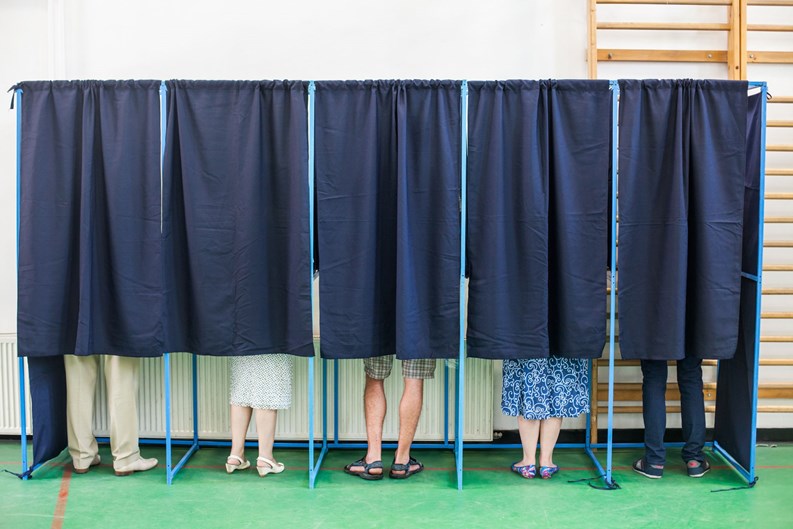Elections are a complicated process. From voting to counting ballots, avoiding even the possibility of fraud...the involvement of Russia…um, wait a minute. We’re getting ahead of ourselves here. In the context of a homeowners’ association or condo building, electing —or re-electing—a board is probably one of the most important exercises resident owners can engage in on behalf of their community. After all, board members are the ones who make the crucial decisions about how their building is run, from maintenance schedules to major capital improvements.
Most board members are elected by their neighbors. For example, Mr. Smith runs for a spot on the board, and residents like Mrs. Jones vote for him. However, the process often raises questions among candidates and voting residents alike about what the proper procedures are, when everyone must be notified of an upcoming election, and the use of proxy ballots. While the process may seem complicated at times, it doesn’t have to be. Let’s break it down.
First Steps
First, the election for the board of directors or board of managers is generally held at the annual meeting for the corporation of condominiums. “Each community will need to follow their state statutes and governing documents, such as the bylaws, as we have seen some documents even call for a semi-annual election,” says Ruth Ingoldsby of Vote HOA Now in Tigard, Oregon. “Ultimately the board has a fiduciary duty to the association, which includes doing what is necessary to have a fair election.”
An election process also differs from region to region and state to state. Some buildings use paper ballots, while others use online voting. Choosing the election method depends on the building and, of course, their bylaws. However, it seems that many boards are changing their voting to online-only and getting rid of paper altogether. “Florida, for example, has already changed their bylaws to go online, but their statute is much different than New York voting,” says Linda Gibbs, President of the Floral Park, New York-based Honest Ballot Association, which handles private elections all over the country with condos, co-ops, and associations. “So many people that want to vote need to vote, and yet they don’t have the opportunity, like homebound residents. However, nowadays, the elderly are using Skype or using their phones.”
A Florida board wishing to implement online voting must have the owners’ consent, and have a method to verify the identity of the voters and ensure the secrecy of election ballots,” says Lisa Magill, Of Counsel at Kaye Bender Rembaum, which has offices in Pompano Beach and Palm Beach Gardens. They must then test the system at least 14 days before the election, ensuring that owners’ computers, smartphones or other devices can communicate directly with the tabulation system. According to Magill, whatever system is used, it must authenticate the voter’s identity, ensure that the vote wasn’t modified or altered in transit, give a receipt to the voter, separate the identity of the voter from the vote itself, and keep the actual votes accessible for future inspections or audits.
It’s interesting to note that there is only one difference between the actual process of co-op and condo voting no matter where the location. “The only difference is that it just depends on the shares,” says Gibbs. “A condo does voting by percentage of interest and a co-op would do voting by shares or cumulative voting, but otherwise there’s no difference. Also, it depends on the bylaws whether they say they have to vote in-person or they have to vote by proxy or by absentee ballot.”
“Condominiums have a better election process than HOAs and co-ops here in Florida,” says attorney Eric Glazer, founding partner of the law firm of Glazer & Sachs, P.A., in Fort Lauderdale. “In a condo, the association must mail a notice of the annual meeting at least 60 days before the election. Unit owners then have the opportunity to submit their name as a candidate. At least 14 days before the election, the association then sends out ballots to all the unit owners. These ballots are placed in envelopes labeled Ballot Envelopes, but otherwise unmarked.” The ballot envelope is then placed in a larger envelope that the owner is required to sign and put their unit number. The envelopes are opened at the annual meeting after the signatures on the outer envelopes have been verified.
In co-ops, “Voting by proxy is not allowed,” says Glazer, “A quorum of owners is not required. However, 20 percent of the owners must participate in the election for it to be valid.”
By contrast, he says, in an HOA, unit owners just show up at the annual meeting, and nominations can be taken from the floor. Even people who are not present at the meeting can be nominated. Here, voting by proxy is allowed, and owners try to gather their neighbors’ proxies in advance of the meeting. However, there must be enough attendees at the annual meeting to make a quorum in order to have an election. If a quorum doesn’t show up, the current board members just continue for another year.
“Condo owners can appeal to the [state] Ombudsman’s Office if they have a problem,” says Brian Gittens, President of The Voting Group, which is based in New York but conducts elections in Florida and elsewhere. “But HOAs are not under their jurisdiction yet, so they can’t ask the Ombudsman’s Office for help if they need it.”
Proxy Particulars
What is a proxy? There are two kinds of proxies actually —directed and discretionary. “A directed proxy is where we put the names on a proxy,” says Gibbs. “The discretionary proxy is where they have no names on it and they just give that proxy to a person, then [that person] brings it in, and we give them the ballot. I like to send a proxy with the names of the people who are running. Sometimes, I don’t have the names because the nominations are from the floor. Then, we just bring a blank ballot and put their names on the night of the annual meeting.”
According to attorney Ronald A. Sher of Himmelfarb & Sher LLP in White Plains, New York, at the annual meeting the property manager works in the capacity as the inspector of elections, signing in the shareholders, giving out the ballots and doing a tabulation to determine whether a quorum is present. “This quorum represents 50.1 percent of the shareholders in person or in proxy, but that’s not by unit, it’s by shares,” says Sher.
Once all of the votes are in, the ballots are collected and the inspection will continue in another room, depending on how many units there are. “They will tabulate and keep all the ballots and their tabulations and will issue a report of inspectors that will certify their results, indicating which candidates received which number of votes and who was the winner,” says Sher.
Keeping It Honest
Sadly, fraud and impropriety happen in the voting process. For example, a quick internet search and you’ll find that, in Florida, El Nuevo Herald and Univision 23 launched an investigation that revealed many cases of electoral fraud and forgery, conflicts of interest, mismanagement, and rigged bidding systems among many condo associations in South Florida.
Last year, an article on nurse Virgilia Corcés was printed in the Miami Herald, where she talks about not voting in the election for the board of directors of her condominium, The Beach Club at Fontainebleau Park in northwest Miami-Dade. However, a vote with her signature turned up as did dozens of others.
So, how do you keep your election honest?
“There are ways that people will attempt to submit fraudulent proxies or times that people make claims that it was an erroneous tabulation or calculation of the ballots, or that certain people should not have been permitted to vote because they didn’t have the effective proxy,” says Sher. “Generally you trust your accountants, attorney and managing agent to preserve the integrity of that system.”
During the actual voting itself, in condos and co-ops, the rules require that you ask for volunteers who are not running for the board or living with someone who is running for the board to help with the election process. Usually, the condo association attorney or the manager administers and runs the annual meeting, says Glazer. In addition, if 15 percent of the unit owners sign a petition, a member of the Office of the Condominium Ombudsman will come and supervise the election for a fee.
Hiring an outside company to oversee an election is also an option. “We are impartial—we do not care who wins or loses,” says Gibbs, adding that professional tabulators are often also more affordable than attorneys. Gittens adds that there are many methods that can be used to ensure security, for example, using special paper that cannot be copied, using a barcode that identifies the bearer, signature verification and asking shareholders for a photo ID before allowing them to cast their ballot.
But not everybody feels the same way. Glazer counters that “In Florida, at the moment, there are absolutely no formal qualifications for an outside company, nor will the state sanction any specific company. So if `Fred’s Computer Company’ in the Philippines, for example, says they can handle the electronic voting, they get the job.”
Gibbs says that the board and the property manager shouldn’t be involved otherwise. “It’s privileged information how people vote and a lot of these places want to do their own mailings,” says Gibbs. “How do I know they’re going to the right apartments? If I have the mailing list, I send it everyone and we have a receipt showing that that mail went out, so if there was any protests, we could back it up.”
Typically, either a voting committee, owner member volunteers, or representatives from the management company will tabulate and confirm the votes, so it is up to the people involved to be honest. “When using online voting, this tabulation is done by the voting system and votes cannot be altered so there is no worry of miscalculated or miscounted votes,” says Ingoldsby.
I Object!
So what happens if someone (usually a group of unit owners) contests an election? In Florida, they have 60 days to do so. Election disputes are typically overseen by arbitrators employed by the Department of Business & Professional Regulation (DBPR). According to Glazer, professional arbitration keeps disputes out of the courts while still providing both sides a chance to be heard.
Similarly, unit owners have the right to recall any member of the board. “Generally speaking,” says Glazer, “if 50 percent of the eligible voters sign a specific petition seeking the removal of a board member, that board member is removed. However, it’s oftentimes a complicated procedure that results in arbitration proceedings.”
Another complicated—although unusual—situation can arise if a board refuses to hold new elections. In these cases, says Gittens, co-ops and condos can petition the Ombudsman’s Office, which will exert pressure on the association. Fines may be levied if the association doesn’t comply.
Going through with such a process, of course, is not cheap. “You’ve got to hire your own lawyers,” says Gibbs. Then, she says, “The ombudsman or arbitrator gets the lawyers together.”
Following the bylaws to the T will help avoid any potential election problems and, once the votes are tallied and the election is over, you can move on to more important things.
Lisa Iannucci is a freelance writer and longtime contributor to The South Florida Cooperator.







11 Comments
Leave a Comment